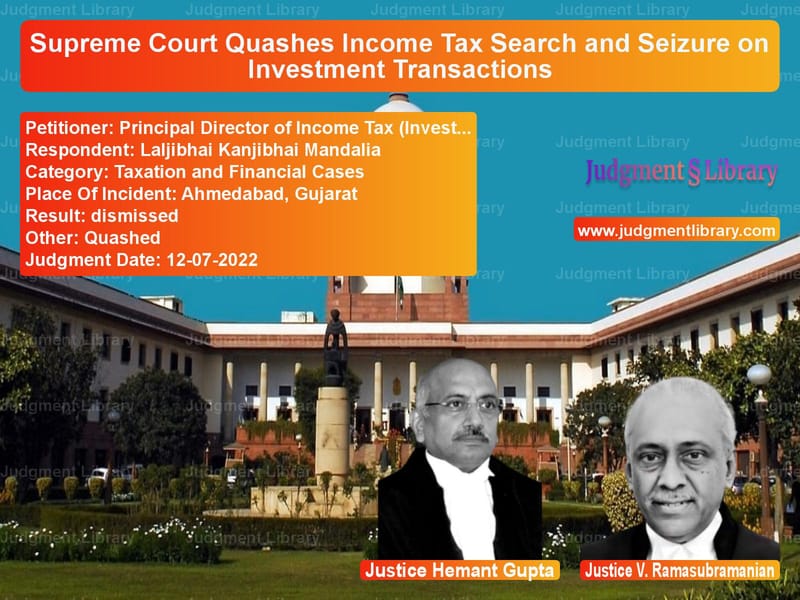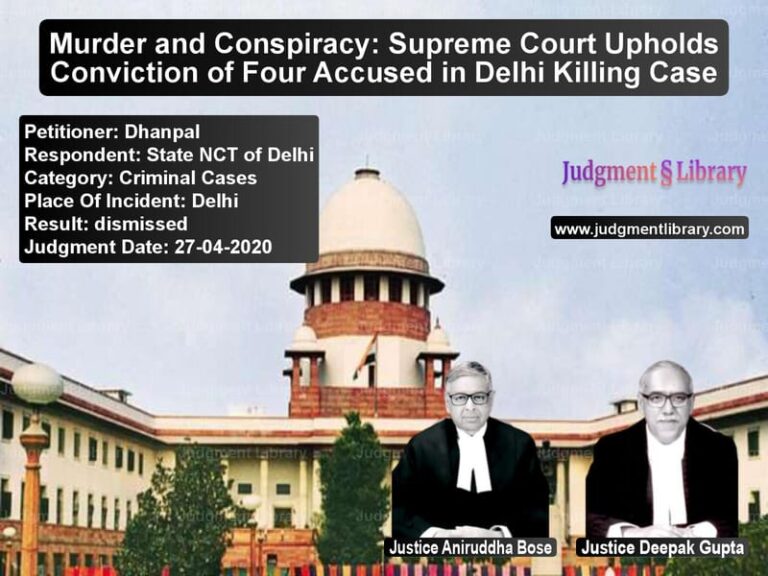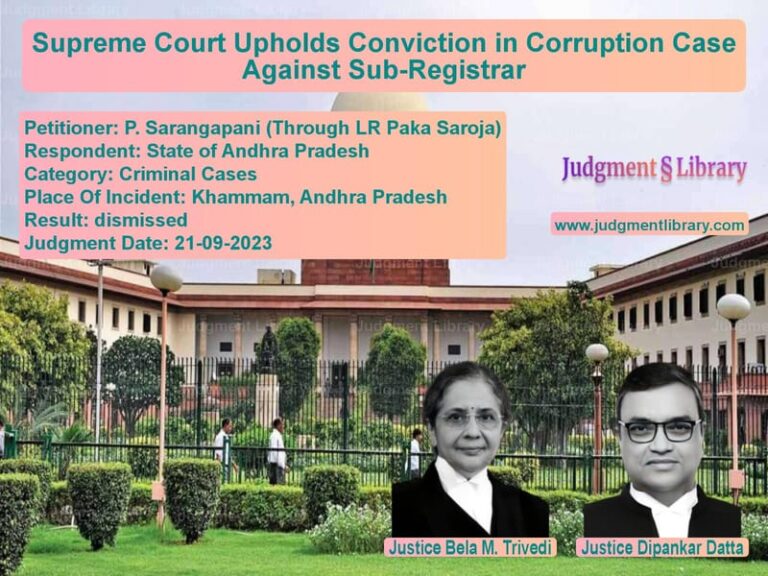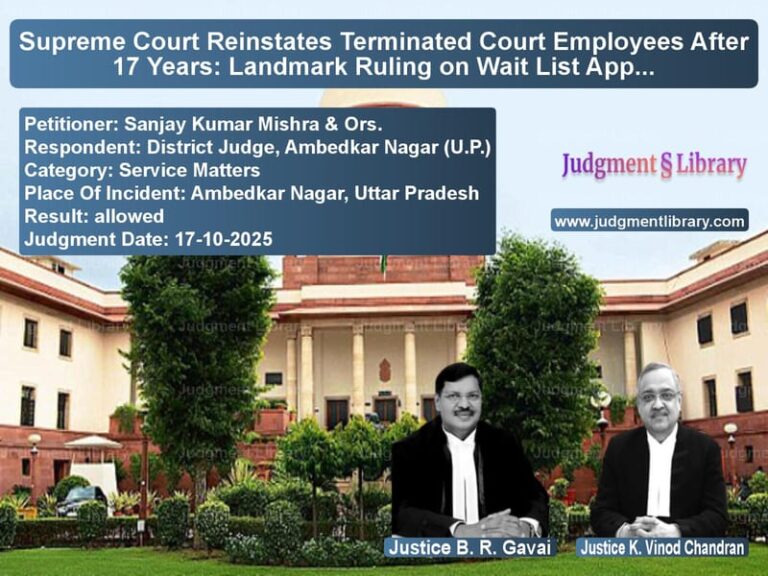Supreme Court Quashes Income Tax Search and Seizure on Investment Transactions
The Supreme Court of India recently delivered a landmark judgment in the case of Principal Director of Income Tax (Investigation) & Ors. vs. Laljibhai Kanjibhai Mandalia. The case revolved around a search and seizure operation initiated under Section 132 of the Income Tax Act, 1961. The Supreme Court ruled in favor of the respondent, setting aside the search and seizure conducted at his premises.
Background of the Case
The case originated from an order by the Gujarat High Court, which had quashed the warrant of authorization issued for search and seizure. The appellant, the Income Tax Department, challenged this order before the Supreme Court.
The respondent, Laljibhai Kanjibhai Mandalia, had invested Rs. 10 crores in M/s. Goan Recreation Clubs Pvt. Ltd., a company involved in the casino business in Goa. The loan was secured against a mortgage property, and the full amount was repaid with interest within a year. The respondent declared the interest income in his income tax return.
Petitioner’s Arguments (Income Tax Department)
The Income Tax Department justified the search and seizure on the following grounds:
- The respondent’s investment of Rs. 10 crores in a newly incorporated company, which had no financial track record, raised suspicion.
- The transaction appeared to be a mere accommodation entry to introduce unaccounted black money into the company.
- The department had credible information suggesting that the company was involved in dubious financial transactions.
- The investment was structured to resemble a genuine loan but was in reality a modus operandi to launder unaccounted income.
- The quick repayment of the loan indicated that the money was cycled back after being utilized for undisclosed purposes.
Respondent’s Arguments (Laljibhai Kanjibhai Mandalia)
The respondent challenged the validity of the search and seizure, arguing:
- The investment was made legally, documented, and duly reflected in financial records.
- The loan was secured by a mortgage, and the repayment was made in accordance with the agreed terms.
- Interest earned from the transaction was reported in his income tax return and taxed accordingly.
- The Income Tax Department’s claim that the investment was suspicious was based on conjecture and not backed by concrete evidence.
- The search and seizure operation was a fishing inquiry conducted without any substantive grounds.
Supreme Court’s Observations
The Supreme Court analyzed the matter and made several key observations:
- The term “reason to believe” under Section 132 of the Income Tax Act must be based on tangible and credible material, not mere suspicion.
- There was no prima facie evidence that the investment was an accommodation entry.
- The transaction was duly recorded, disclosed, and taxed, which negated the argument that it was unaccounted money.
- The mere fact that a company receiving investment had no prior financial history does not automatically imply illegality.
- The Revenue Department failed to establish a direct link between the respondent’s investment and alleged tax evasion.
Final Judgment
The Supreme Court ruled in favor of the respondent and held:
- The search and seizure operation was conducted without a valid reason to believe that income had been concealed.
- The authorization for search and seizure under Section 132 was quashed.
- The Revenue Department’s assumption of tax evasion was not substantiated with concrete evidence.
- The respondent had complied with tax laws by disclosing the investment and reporting the interest income.
Implications of the Ruling
This judgment reinforces several important legal principles:
- Search and seizure powers cannot be exercised arbitrarily. There must be a clear and justifiable reason to believe that tax evasion has occurred.
- Proper documentation and tax compliance protect taxpayers from unwarranted scrutiny and legal action.
- The burden of proof rests with the Income Tax Department to establish a credible link between a financial transaction and tax evasion.
- The judiciary continues to act as a safeguard against misuse of search and seizure provisions under the Income Tax Act.
The ruling serves as a precedent for future cases where tax authorities initiate search and seizure operations without strong legal backing. It underscores the importance of ensuring that enforcement actions are based on solid evidence rather than mere suspicion.
Petitioner Name: Principal Director of Income Tax (Investigation).Respondent Name: Laljibhai Kanjibhai Mandalia.Judgment By: Justice Hemant Gupta, Justice V. Ramasubramanian.Place Of Incident: Ahmedabad, Gujarat.Judgment Date: 12-07-2022.
Don’t miss out on the full details! Download the complete judgment in PDF format below and gain valuable insights instantly!
Download Judgment: principal-director-o-vs-laljibhai-kanjibhai-supreme-court-of-india-judgment-dated-12-07-2022.pdf
Directly Download Judgment: Directly download this Judgment
See all petitions in Income Tax Disputes
See all petitions in Tax Evasion Cases
See all petitions in Banking Regulations
See all petitions in Judgment by Hemant Gupta
See all petitions in Judgment by V. Ramasubramanian
See all petitions in dismissed
See all petitions in Quashed
See all petitions in supreme court of India judgments July 2022
See all petitions in 2022 judgments
See all posts in Taxation and Financial Cases Category
See all allowed petitions in Taxation and Financial Cases Category
See all Dismissed petitions in Taxation and Financial Cases Category
See all partially allowed petitions in Taxation and Financial Cases Category







